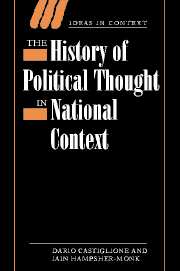Book contents
- Frontmatter
- Contents
- List of contributors
- Preface
- 1 Introduction The history of political thought and the national discourses of politics
- 2 The voice of the ‘Greeks’ in the conversation of mankind
- 3 History of political theory in the Federal Republic of Germany: strange death and slow recovery
- 4 A German version of the ‘linguistic turn’: Reinhart Koselleck and the history of political and social concepts (Begriffsgeschichte)
- 5 One hundred years of the history of political thought in Italy
- 6 Discordant voices: American histories of political thought
- 7 The professoriate of political thought in England since 1914: a tale of three chairs
- 8 The history of political thought and the political history of thought
- 9 The rise of, challenge to and prospects for a Collingwoodian approach to the history of political thought
- 10 Towards a philosophical history of the political
- 11 ‘Le retour des émigrés’? The study of the history of political ideas in contemporary France
- 12 National political cultures and regime changes in Eastern and Central Europe
- 13 The limits of the national paradigm in the study of political thought: the case of Karl Popper and Central European cosmopolitanism
- 14 Postscript. Disciplines, canons and publics: the history of ‘the history of political thought’ in comparative perspective
- Index
- IDEAS IN CONTEXT
12 - National political cultures and regime changes in Eastern and Central Europe
Published online by Cambridge University Press: 23 September 2009
- Frontmatter
- Contents
- List of contributors
- Preface
- 1 Introduction The history of political thought and the national discourses of politics
- 2 The voice of the ‘Greeks’ in the conversation of mankind
- 3 History of political theory in the Federal Republic of Germany: strange death and slow recovery
- 4 A German version of the ‘linguistic turn’: Reinhart Koselleck and the history of political and social concepts (Begriffsgeschichte)
- 5 One hundred years of the history of political thought in Italy
- 6 Discordant voices: American histories of political thought
- 7 The professoriate of political thought in England since 1914: a tale of three chairs
- 8 The history of political thought and the political history of thought
- 9 The rise of, challenge to and prospects for a Collingwoodian approach to the history of political thought
- 10 Towards a philosophical history of the political
- 11 ‘Le retour des émigrés’? The study of the history of political ideas in contemporary France
- 12 National political cultures and regime changes in Eastern and Central Europe
- 13 The limits of the national paradigm in the study of political thought: the case of Karl Popper and Central European cosmopolitanism
- 14 Postscript. Disciplines, canons and publics: the history of ‘the history of political thought’ in comparative perspective
- Index
- IDEAS IN CONTEXT
Summary
The genesis of modern states in Eastern and Central Europe was no linear process. Whilst enlightened political literature in the last decades of the eighteenth century and the first decades of the nineteenth century was sympathetic to imperial power, things changed during the romantic period, when well-meaning scholars shaped the modern idea of nationhood. They regarded linguistic unity as both demonstrating the existence of a national spirit and contributing to the very formation of the nation-state. National identity was asserted in opposition to the thin cosmopolitanism encouraged by imperial administration and the Habsburg tradition of political thought was ignored. Austrian cosmopolitanism of the eighteenth and nineteenth centuries, which had helped to avoid inter-confessional and inter-ethnic conflicts, lost its cultural and political role. In its place, there emerged nationalist doctrines, which were seized upon in the newly consolidated nations of the ‘Dual Empire’ in the hope of reasserting their own separate dignities. All modes of cultural expression, from sciences and literature to journalism and art, were influenced by this ‘nationalist turn’.
Linguistic borders, always hard to define, were to generate many misunderstandings among the states emerging from the ruins of the empires that had for so long dominated the region. All nations tended to assert their own identity by denying it to others, particularly to the nations in close proximity. The cultural and national identity of the Greeks was constructed by denying it to the Turks. Bulgarian national consciousness was asserted against that of Greece and Turkey. The Romanian, Serbian, and Croatian nations considered the Magyar nation to be the main enemy of their own development.
- Type
- Chapter
- Information
- The History of Political Thought in National Context , pp. 228 - 246Publisher: Cambridge University PressPrint publication year: 2001

